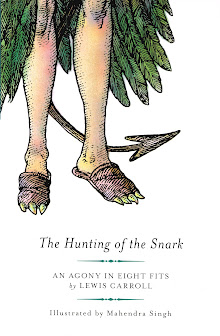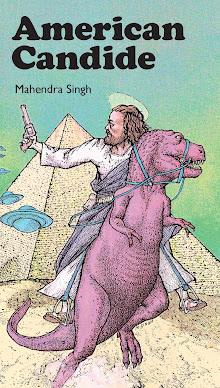It's a fair cop, guv'nor! The Bellman, assisted by the Fellowship of the Snark, brandishes his clochetic truncheon at this wallah's stoney noggin. Note further, my dear Watson, that a close reading of the text with a fine-toothed comb and well-knitted brow elicits the following facts:
Given …
The duncedness of this otherwise un-named crewmember is literally not-to-be-believed, a statement which itself is not-to-be-believed since it has not been repeated the requisite three times.
Given …
The sole thought of this non-nonbelievable dunce is Snark.
From which …
To possess a dunce is to possess a ready-made Platonic Ideal of a Snark — and in a very handy demi-godlike package too!
And therefore…
This dunce is no dunce, eh? QED!
So, our dunce is an imposter disguising himself as an Easter Island moia with an uncanny penchant for resembling the notorious French confidence-picturist and double-crosser, Eugène Delacroix! After some rough handling and quick bell-work, the so-called Eugène made the following (internal, hence epistemologically dunciad) statement:
"… one should not be too difficult. An artist should not treat himself like an enemy. Experience ought to teach us two things: first, that we should do a great deal of correcting, secondly, that we must not correct too much."
Proof positive and bob's your uncle! This man's an absolute diabolical numbskull, cunningly fitted out with all the French Polynesian deviltry necessary to hold two simultaneously opposing thoughts at once — the very conditions necessary for a Snark to flourish inside the old brain pan! Pseudo-neoplatonic skullduggery with alarming whiffs of a faux-phrenological sub-gnostic epistemological thing-um-a-jiggery — some sort of game's afoot! I could have had a job with NASA but I'm sticking it out with this snark business, I'm a brainworker!
Monday, August 21, 2017
Monday, August 14, 2017
Nonsense is sanity, sanity is nonsense
Immigration and Customs Officer: Have you any personal articles of clothing?
A Baker resembling Lewis Carroll: I don't know.
Immigration and Customs Officer: Have you any luggage or packages?
A Baker resembling Lewis Carroll: I don't know.
Immigration and Customs Officer: Can you state your own name?
A Baker resembling Lewis Carroll: I don't know.
Immigration and Customs Officer: Can you make bridecake?
A Baker resembling Lewis Carroll: I don't know.
Immigration and Customs Officer: Do you not know whether you can make bridecake or are you simply unable to procure the materials to do so?
A Baker resembling Lewis Carroll: I don't know.
Immigration and Customs Officer: You can't be serious, what does all this mean?
A Baker resembling Lewis Carroll: I don't know.
Note that the Baker consistently eschews the binary either-or of conventional logic upon which his interlocutor is depending, resorting instead to the triunary-based logic of "I don't know". We have already seen how the principle of threes supersedes all other logical statements (what I tell you three times is true) aboard the HMS Snark. Thus, the Baker disposes of the boojum of binary Marxist dialectical materialism, its frumious one-two is slain by his manxome one-two-three! Huzzah! The vorpal blade of the trinitarian Snarkist trialectic immaterialism goes snicker-snack! Oh, there's a PhD dissertation somewhere in all of this — oh frabjous day! Callooh! Callay!
A Baker resembling Lewis Carroll: I don't know.
Immigration and Customs Officer: Have you any luggage or packages?
A Baker resembling Lewis Carroll: I don't know.
Immigration and Customs Officer: Can you state your own name?
A Baker resembling Lewis Carroll: I don't know.
Immigration and Customs Officer: Can you make bridecake?
A Baker resembling Lewis Carroll: I don't know.
Immigration and Customs Officer: Do you not know whether you can make bridecake or are you simply unable to procure the materials to do so?
A Baker resembling Lewis Carroll: I don't know.
Immigration and Customs Officer: You can't be serious, what does all this mean?
A Baker resembling Lewis Carroll: I don't know.
Note that the Baker consistently eschews the binary either-or of conventional logic upon which his interlocutor is depending, resorting instead to the triunary-based logic of "I don't know". We have already seen how the principle of threes supersedes all other logical statements (what I tell you three times is true) aboard the HMS Snark. Thus, the Baker disposes of the boojum of binary Marxist dialectical materialism, its frumious one-two is slain by his manxome one-two-three! Huzzah! The vorpal blade of the trinitarian Snarkist trialectic immaterialism goes snicker-snack! Oh, there's a PhD dissertation somewhere in all of this — oh frabjous day! Callooh! Callay!
Monday, August 7, 2017
Cogito Ergo Snark
A nautical though nice bit of ink-stained gallimaufry in which we see the Baker's character (still anonymous though!) in a better light, perhaps even the light which shines down from above, the light to which the Baker refers with his finger, in fact, the light for which one does not lack when heaven guides the way.
 If one were to see the Baker in a philosophical light, one might say that he carries about him a certain Platonic air, a mystical faith in a universal flashlight which he carries about with himself wherever he goes and which enlightens his path in even the darkest caves of the human mind. It is this mental flashlight which provides him with the aplomb necessary to navigate through the thickets of hyenas and bears in which he finds himself today. Note also that he smiles at his tormentors, a Mona Lisa sort of smile which says to his would-be tormentors: I know that you are not real, that you are merely shadows of a Higher Hyena and Bigger Bear.
If one were to see the Baker in a philosophical light, one might say that he carries about him a certain Platonic air, a mystical faith in a universal flashlight which he carries about with himself wherever he goes and which enlightens his path in even the darkest caves of the human mind. It is this mental flashlight which provides him with the aplomb necessary to navigate through the thickets of hyenas and bears in which he finds himself today. Note also that he smiles at his tormentors, a Mona Lisa sort of smile which says to his would-be tormentors: I know that you are not real, that you are merely shadows of a Higher Hyena and Bigger Bear.
The ursine fellow to the Baker's left is a Gradgrindish sort of fellow, well-schooled in the Facts of Life, ma'am, a scholastic air about him, Aristotelian even, judging by his know-it-all headware. He has no need for invisible flashlights (or torches, as LC would say), he relies upon Facts, just the Facts & their Causes, perhaps even some Numbers, and that's That! He carries a book, not for idle speculation but for assaulting lesser-minded weaklings such as the Baker with.
At their feet we see a personage in the guise of a drawing of a hyena taken from a xerox of a photograph of Heraclitus copied from a painting of a second-hand redaction of the life of Michelangelo as told to Vasari. This reflective beast is lounging pool-side, debating whether 'tis best to plunge entirely into the waters or better still to merely dabble the tips of one's toes in the waters. He is consumed with doubt lest he be unable to bathe in the same waters twice. Incidentally, it appears as if he is also consumed with a petty jealousy over the excellent design of the panel in which he finds himself depicted.
Not only is it a cunning gloss upon the above Stanza, but it also illustrates the wisdom of obtaining one's artistic training at a qualified and accredited institute of higher learning, a precaution which this hyenaic gentleman's rival, the infamous Raphael (not shown here) attended to by graduating cum laude from the Roman campus of the School of Athens.
 If one were to see the Baker in a philosophical light, one might say that he carries about him a certain Platonic air, a mystical faith in a universal flashlight which he carries about with himself wherever he goes and which enlightens his path in even the darkest caves of the human mind. It is this mental flashlight which provides him with the aplomb necessary to navigate through the thickets of hyenas and bears in which he finds himself today. Note also that he smiles at his tormentors, a Mona Lisa sort of smile which says to his would-be tormentors: I know that you are not real, that you are merely shadows of a Higher Hyena and Bigger Bear.
If one were to see the Baker in a philosophical light, one might say that he carries about him a certain Platonic air, a mystical faith in a universal flashlight which he carries about with himself wherever he goes and which enlightens his path in even the darkest caves of the human mind. It is this mental flashlight which provides him with the aplomb necessary to navigate through the thickets of hyenas and bears in which he finds himself today. Note also that he smiles at his tormentors, a Mona Lisa sort of smile which says to his would-be tormentors: I know that you are not real, that you are merely shadows of a Higher Hyena and Bigger Bear.The ursine fellow to the Baker's left is a Gradgrindish sort of fellow, well-schooled in the Facts of Life, ma'am, a scholastic air about him, Aristotelian even, judging by his know-it-all headware. He has no need for invisible flashlights (or torches, as LC would say), he relies upon Facts, just the Facts & their Causes, perhaps even some Numbers, and that's That! He carries a book, not for idle speculation but for assaulting lesser-minded weaklings such as the Baker with.
At their feet we see a personage in the guise of a drawing of a hyena taken from a xerox of a photograph of Heraclitus copied from a painting of a second-hand redaction of the life of Michelangelo as told to Vasari. This reflective beast is lounging pool-side, debating whether 'tis best to plunge entirely into the waters or better still to merely dabble the tips of one's toes in the waters. He is consumed with doubt lest he be unable to bathe in the same waters twice. Incidentally, it appears as if he is also consumed with a petty jealousy over the excellent design of the panel in which he finds himself depicted.
Not only is it a cunning gloss upon the above Stanza, but it also illustrates the wisdom of obtaining one's artistic training at a qualified and accredited institute of higher learning, a precaution which this hyenaic gentleman's rival, the infamous Raphael (not shown here) attended to by graduating cum laude from the Roman campus of the School of Athens.
 |
| The School of Athens, by some other Carrollian artist |
Subscribe to:
Comments (Atom)










